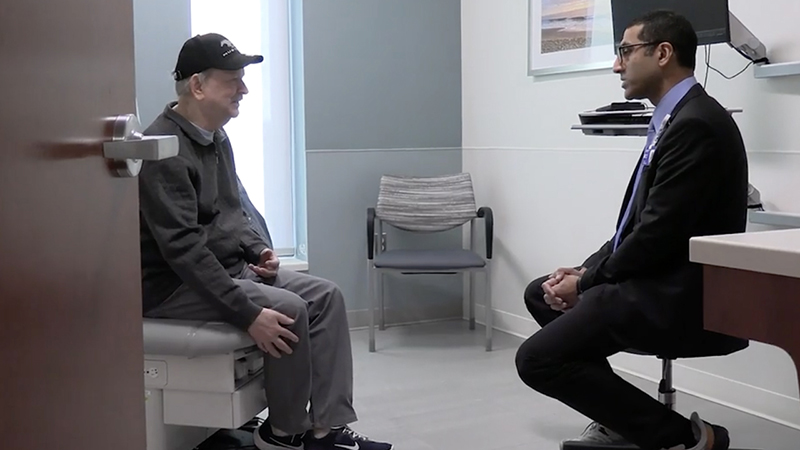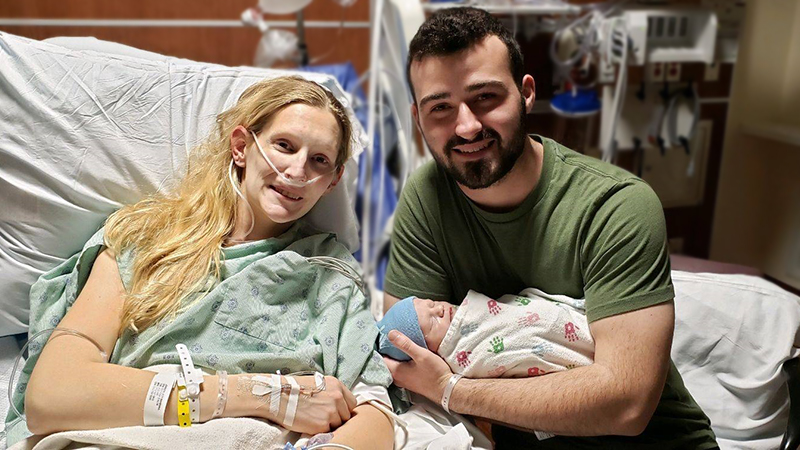At-Home Dialysis Restores Quality of Life
Convenient Kidney Care
Published March 2023
Your kidneys are your body's filtration system. They remove waste from your bloodstream and eliminate it as urine. If your kidneys are not functioning properly due to a disease, like end-stage renal disease, an advanced stage of chronic kidney disease, you may need a medical intervention called dialysis. Dialysis helps filter the waste and excess fluid from your blood.
We train the patients to do dialysis at home.— Vikram Aggarwal, MD
There are two types of dialysis:
- Peritoneal dialysis: Uses your peritoneum (membrane in your abdomen) to filter your blood.
- Hemodialysis: Uses a surgically placed arteriovenous (AV) fistula and a machine to filter your blood.
Hemodialysis typically involves coming into a hospital or dialysis center to get treatment several times a week for four to five hours each time. Northwestern Medicine offers a more convenient option so patients can get dialysis within the comfort of their own homes.
Dialysis at Home
For patients who need dialysis several times a week for kidney failure, there is a treatment option that allows greater flexibility, independence and management — home hemodialysis (HHD).
HHD is an option for patients who want to plan their dialysis sessions to fit into their schedules and who also want to receive treatment at home or while traveling. HHD also allows for more frequent dialysis, which offers many benefits, including fewer symptoms between dialysis sessions, fewer travel expenses and a shorter recovery time. Treatment can be done safely during the day or overnight as you sleep.
Despite its significant benefits and established safety, HHD is not widely used in the U.S., only 3% of patients with end-stage renal disease use it. This is because many people don’t know that it’s an available treatment option and experience with HHD is not common.
To ensure that you have all of the skills and confidence needed to do HHD, Northwestern Medicine professionals train you before you start.
“We train the patients to do dialysis at home,” says Vikram Aggarwal, MD, medical director of the Northwestern Medicine Home Dialysis Program. This helps people who work during the day since it can be done at their convenience instead of being limited to hours of operation at a center, which may overlap with their work schedule.
At-Home Hemodialysis in Action
Areli Saldana and her mother, Claudia Sanchez, chose HHD. Areli, a mother of two, needed to start dialysis after being diagnosed with end-stage renal disease (advanced CKD) due to lupus, an autoimmune disease that can affect many organs in the body, including the kidneys. Lupus can lead to kidney inflammation, which can cause kidney dysfunction and, eventually, kidney failure.
While Areli wanted to do dialysis at a center three times a week, she also wanted to continue working to support her family. After receiving dialysis education, Areli chose home hemodialysis through Northwestern Medicine so that she could keep working, being around her family and enjoying a better quality of life.
Areli began home hemodialysis after work —three days a week and on the weekends. After a few months of administering her own treatment, Areli started helping her mother with her HHD. Claudia is a kidney transplant recipient who later experienced failure with her transplanted kidney. Dr. Aggarwal advised both to seek a kidney transplant.
In February 2021, Areli received her transplant, and in June 2022, Claudia received hers. Both transplants were living-donor kidney transplants, through the Northwestern Medicine Living-Donor Kidney Paired Exchange Program. Their respective sisters were their paired kidney donors.
“Optimal and patient-centered education regarding various options for managing advanced chronic kidney disease and end-stage renal disease is vital in empowering patients to make the right choice that suits their lifestyle and goals,” says Dr. Aggarwal. “Our dedicated team in the Home Dialysis Clinic offers continued support and motivation to help patients navigate through the various challenges of being on dialysis.”
In addition, close collaboration between the Kidney Transplant and Dialysis teams encouraged the patients during the process of kidney transplantation.
“It is so much information, and we think we may not be capable to do it,” says Areli. “But you can handle it, and you will learn. I wanted to see my kids grow up, and I told myself I can to do it. We have to keep going and fighting.”
Both Areli and Claudia are doing well today.







